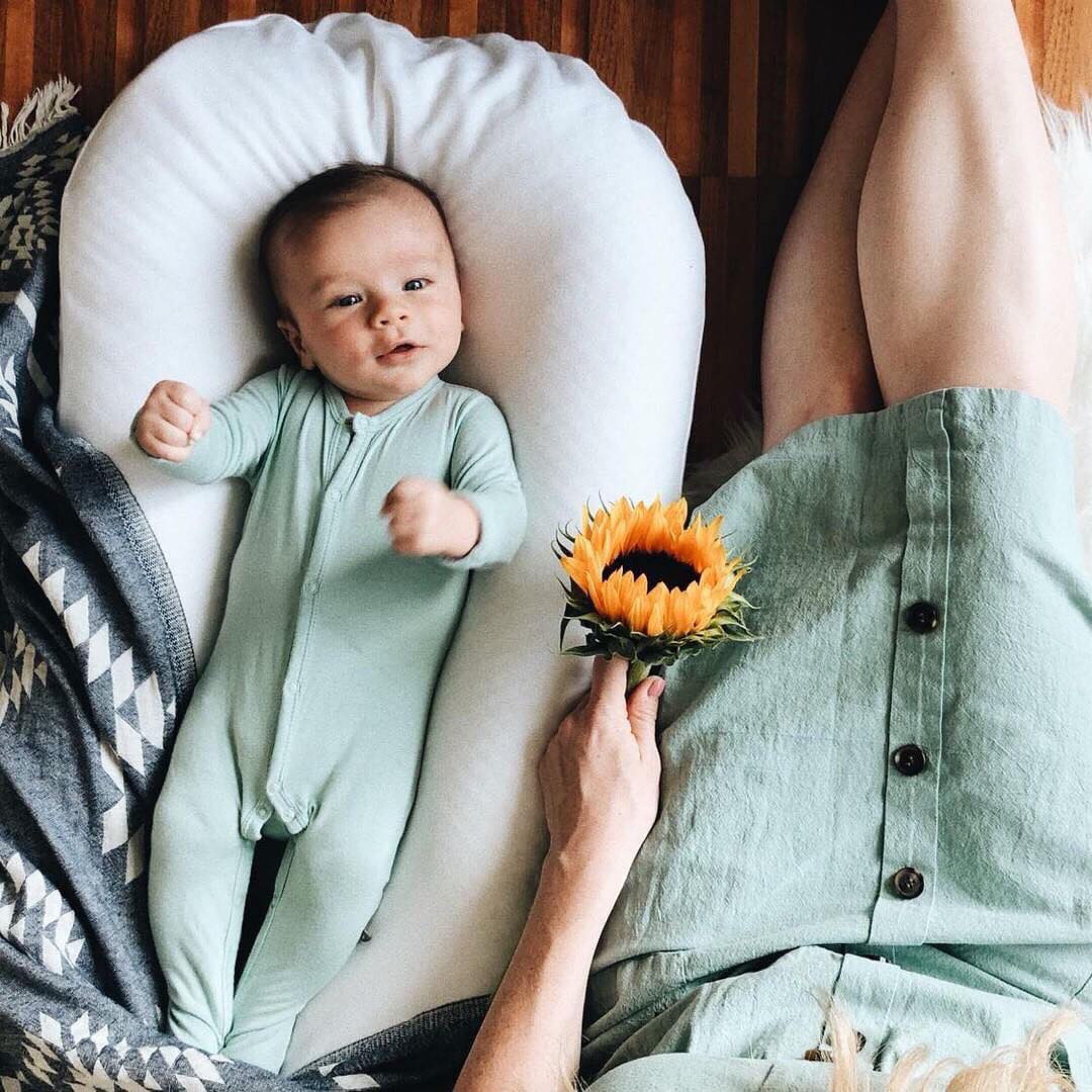To say there was a lot I didn’t know about motherhood before becoming a mom would be a huge understatement. As someone who is very much a “plan ahead” type of person, I was humbled by how ill-prepared I actually was when the time came. My entire pregnancy was spent reading up on any information surrounding pregnancy, labor, child-rearing, you name it. I spent a whole trimester carefully curating my Amazon baby registry, based on various “Must-Have Items” and “Things We Didn’t Need” lists made by every mommy blogger ever. I made sure that I had every item I could possibly need for my baby in the first two years, from diapers to teething toys to potty training materials. Crazy, I know.
Yet, from the moment my baby arrived, it felt like my preparation had been for naught. There were a million things that I suddenly needed to remember and learn, and it was overwhelming. Well-wishers were texting and calling, asking how I was doing, if they could help, and for pictures of the baby. I couldn’t bring myself to even look at my phone, and didn’t answer a single text until nearly a week later. Once we were home from the hospital, my mom stopped by every day to bring me home-cooked meals. Instead of feeling grateful or relieved, I begged her to stop coming by unannounced. She fussed and fretted over me, rushing to my aid whenever I got up to do anything. You need to lay in bed and relax! It was mid-August, 105 degrees outside, and because we didn’t have central AC, my daughter was either only in a diaper or a short sleeve bodysuit. She’ll get cold! You need to cover her up! I always ended up nearly pushing her out the door.
The best way to describe how I felt the first week postpartum is like I’d been thrown in the deep end of a pool before learning to swim. I’d gone from only ever worrying about myself to suddenly being responsible for another human whose existence depended on me, and the weight of that grave realization was heavy. I panicked. What have I done? My entire adult life had been some version of work, play, sleep, repeat with complete freedom. I’d go to the gym in the early morning and spend the evening watching shows or movies on Netflix with my husband. Now, it was round-the-clock care for a newborn, while trying to recover from an exhausting and painful delivery. There was no end in sight and the stress was debilitating. It wasn’t until I turned to the Internet, desperately scouring articles and forums for advice and anyone who could commiserate, that I discovered that my weepiness, anxiety, and irritability actually had a name. The baby blues.
The extent that I knew about the baby blues was that it was the name of a comic that I used to read in the Sunday newspaper when I was a child. Unsurprisingly, the comic strip is about a couple learning to navigate parenthood. I never made the connection between the comic strip’s name and its content until my own baby was born. Despite my best efforts to conquer parenthood before I’d even officially become a parent, I was completely in the dark about the postpartum period. Everything I had been obsessing over had to do with the childbirth part and the whole keeping-your-baby-alive-afterward part. So, in the days after I brought my baby home from the hospital, reality hit me like a truck. Actually, three trucks. The my-world-just-turned-upside-down truck, the here-have-some-postpartum-hormones truck, and the you’ll-never-sleep-again truck.

The baby blues, which are the negative feelings and/or mood swings in the days after childbirth, affect about 80% (a staggering majority) of mothers. According to the American Pregnancy Association, the exact cause is unknown, but “thought to be related to the hormone changes that occur during pregnancy and again after a baby is born.” Looking at all the factors that come into play, it’s easy to see how and why the baby blues occur. First, estrogen and progesterone levels fall sharply immediately after childbirth. With such a rapid hormonal change, it’s no wonder that we’re laughing one second and crying another. Second, there’s no time to recover from the physical exhaustion of labor and delivery; we have to hit the ground running, and the sleep deprivation is real. Third, the struggles of breastfeeding can take a physical and emotional toll during an especially fragile time. Learning to care for a newborn is hard enough without the laundry list of other issues that make the adjustment even more difficult.
Four in five new moms report having baby blues after delivery, so the bottom line is that it’s normal. Although I was thrilled to be back in the comfort of my own home, I was so overwhelmed by my new identity and responsibilities that I felt moments of deep despair and was prone to bouts of crying. When the sun set, I felt intense anxiety, knowing that I had another sleepless night ahead of me. Just seeing the statistic that 80% of moms deal with the same feelings made me feel less alone. If so many before me had gotten through it, then it meant there was a light at the end of the tunnel. And there was. The baby blues are temporary, peaking at the third or fourth day postpartum and typically fading after a few weeks. Although Day Four was the most emotionally challenging for me, things got significantly easier by the two-week mark.
During those first and hardest two weeks, I made sure to shower every single day. It was a small act of self-care that did wonders for my mood. That 15-minute period was like meditation. Instead of tending to the baby, I could focus on the warm water massaging my scalp and rinsing the stress away. Sure, sometimes I cried in the shower, but I felt renewed by the time I stepped out. Everyone told me, sleep when the baby sleeps, but I couldn’t force myself to nap in the day, despite being bone-tired. Instead, when my baby slept, I sat down and ate a proper meal. Nights were especially difficult because I exclusively-breastfed my daughter and there wasn’t much my husband could do to help. She woke to feed every hour and a half, like clockwork. I often fell asleep mid-session, only to realize that an hour had gone by, and that I would need to be awake again in half an hour. To keep myself awake, I began watching movies on my phone at the start of each feed. I turned the volume down, put closed captioning on, and paused the movie as soon as she was done nursing. I put her back in the bassinet, and went straight back to sleep. As soon as she was up to eat again, I continued where I’d left off. Rinse and repeat. This tactic made nights bearable for me because it gave me something to look forward to each time I woke up.

I also quickly realized that my mood was directly correlated to the quality of sleep I was having. Leaving expressed milk in the fridge and letting my husband take an early morning shift allowed me to have a four-hour block of sleep. Out of everything I’d done to boost positive emotion, this was the most effective. The effect of sleep deprivation on mood has been well-documented and linked to anxiety, depression, and mood swings, so it’s no wonder that so many new parents ride an emotional rollercoaster. I’d been forewarned about postpartum depression, having filled out an evaluation before being discharged by the hospital, but no one had ever told me about the baby blues. When I reached out to friends and acquaintances with kids to ask if they’d experienced the same thing, the response was a resounding yes.
Becoming a parent is a major life adjustment, so it makes perfect sense that it’s not a smooth transition. There is a fair share of bumps along the way, but fortunately, the baby blues stop on their own without treatment. Persisting sadness and negative emotion may be a sign of postpartum depression, which affects about 15% of mothers. Although I was lucky that the baby blues didn’t progress into something more serious, I didn’t magically feel back to normal after two weeks. I still had bad days, but as the bond with my baby strengthened and I settled into this new version of normal, things got easier. Practicing self-care, whether that meant getting an extra hour of sleep when I could or going outside for a quick walk, was what helped me start to feel like myself again.
I wish that I had known that not only was it okay to be a weepy mess after delivery, but that it was also normal. Even with a supportive partner, the early days of motherhood can be a lonely time. What I would tell my past self is, give yourself grace. If the house is messy, leave it. Use the free hour you have to sleep, shower, eat, or whatever you need in that moment, even if it means watching an episode of your favorite reality TV show. Living for someone else 24/7 is guaranteed to leave you feeling burnt out, so making time for yourself should be a priority. Although the postpartum period is so tough, it does pass quickly, and parenthood itself is a journey of highs and lows. So far, being a mother is simultaneously magical and exhausting. My daughter is now 6 months old and changes so much every day. As author Gretchen Rubin once wrote, the days are long, but the years are short, so I’m just buckling up for the ride.














